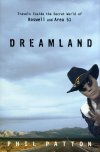 |
LISTINGS

Linked titles can be browsed (or ordered) from Amazon.com Books.
|
|
 |
 |
Nonfiction Notices
 |
Dreamland: Travels Inside the Secret World of Roswell and Area 51, Phil Patton (Villard 0-679-45651-1, $25.00, 13+336pp, hc, August 1998) Here's something you don't see every day: a book with a cover blurb by Thomas Pynchon. ''A mind-opening tale of trespass and revelation, of road adventures, technothriller hardware, saucer folks, and aerospace outlaws...'' Despite the book's cover and its likely classification by booksellers (Locus Online found this book in the New Age section of Barnes & Noble; Ellis's book below, in fiction) this is, like Ellis's book, not what it appears at first glance. Patton, noted for such earlier books as Open Road: A Celebration of the American Highway, has written a sociological account of the mystique of ''Dreamland'' -- a.k.a. Area 51 -- and the people surrounding it, from aerospace pioneers to UFO believers and conspiracy buffs. The Amazon page (which is wrong in bibliographic detail) has comments by Patton, the full Pynchon blurb, and others by Kevin Kelly, John Leonard, et al.
(Mon 3 Aug 98)
|
Imagining Atlantis, Richard Ellis (Knopf, July 1998, $27.50, hc) Not a Charles Berlitz number, or a novel, but an archaeological, historical overview of the Atlantis myth by an author noted for books (and art) on marine topics. The book, and the reviews, illuminate the nature of myth in fantasy and SF. Robert Eisner's review in the July 12th New York Times Book Review writes that Ellis has written an entertaining, thorough yet readable account of the geological and archeological evidence that may have contributed to this peculiar myth, and of the lunatic fringe that has made so much moonshine out of it. The Atlantis story partakes of at least three generic myths: the Golden Age, an idealized time and place where mankind lived in harmony and ease; a decline from the Golden Age into corruption and strife (the ancient world cottoning more to the notion of degeneration than improvement); and cataclysm by fire or flood, the Weather Channel gone haywire. In the July 12th Los Angeles Times Book Review Brian Fagan writes As Ellis remarks, it really does not matter whether Plato's story is a true story, a myth, a parable or even science fiction. Its strength lies in its universality and the fact that it means something to so many people. Ellis ends cogently: ''It is Plato's story, and his alone, and no amount of mysticism, reinterpretation, scuba diving, or archaeology will ever change that.''
(Wed 15 Jul 98)
|
 |
|
 |



